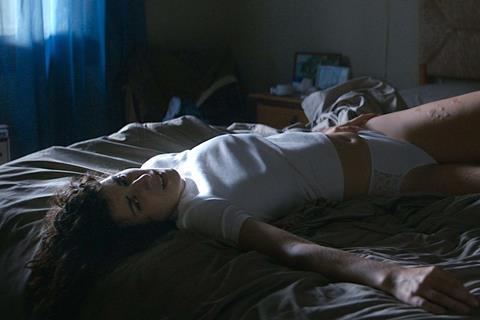A sexually repressed woman confronts her difficult past in this frank Spanish drama from Elena Martin Gimeno

Dir: Elena Martin Gimeno. Spain. 2023. 112mins
A frankly-observed if somewhat overwrought exploration of one woman’s sexual awakening, Creatura has an earthy, fluid style that occasionally tips over into the voyeuristic. That’s perhaps in keeping with the repressed desire and unreliable memories of a troubled woman forced to confront her difficult past, and certainly with the uncompromising approach of director Elena Martin Gimeno, who also plays the lead character. But while it’s refreshing to see such an uninhibited portrayal of female sexuality, particularly one which explores the close relationship between guilt, shame and desire, the film’s focus on the physical can overshadow its intriguing psychological themes.
Explores the close relationship between guilt, shame and desire
Debuting in Cannes Directors Fortnight, this is the second film from the Barcelona-born Gimeno (a Spanish Star Of Tomorrow in 2022), who won accolades and a clutch of awards for her graduation feature Julia Ist (in which she also starred). Creatura should also attract attention for its female-centric story and strong visual identity, potentially seducing further festivals and audiences looking for intelligent adult fare.
Thirty-five-year-old Mila (played as an adult by Gimeno) has moved into her recently deceased grandmother’s home on the rugged Costa Brava coast with her sensitive boyfriend Marcel (Oriol Pla), to be close to his new teaching job. This house, which has hosted annual family summer get-togethers since Mila can remember, proves fertile ground for a re-examination of her past, triggered by her need to understand her difficult relationship with sex. Although she loves Marcel she finds it impossible to be intimate with him, any sexual arousal sparking a deep-rooted shame which manifests as an aggressive rash across her body — something that she’s suffered from since childhood, when her mother used to calm it with seawater.
The relationship between flesh and landscape is crucial to Mila’s understanding of herself, and natural elements inform the film’s visual and aural palette. Wind rustles trees and bangs doors, the ever-present sea is both threat and solace, the score has the deep rumble of excitement and/or fear. Cinematography from Alan Mejia Gonzalez often takes on a prowling style, bringing the suggestion of a genre element to a screenplay co-written by Martin and Clara Roquet — something intensified by the welts on Mila’s body and her penchant for biting her partners at moments of arousal. There’s also another potential real-world darkness swirling in Mila’s history, an idea that the scars of buried trauma may now be manifesting themselves physically.
That does prove to be the case, but not in the way one might expect. The story unfolds through extended flashbacks, first to Mila as a 15-year-old (played by Clàudia Malagelada) pushing her sexual boundaries both with local boys and strangers on the internet and struggling to understand why her father keeps his distance from her — her behaviour, he says, is unnatural, and makes him uncomfortable. Rumours abound that she is a ‘slut’ and ‘dirty’; slurs never attributed to the all-too-willing boys with whom she enjoys those first beach and woodland fumbles. Back further, at age five, Mila (Mila Borras) enjoys an innocent summer with her family until her burgeoning sexual awareness becomes too pronounced to ignore and drives a wedge between her and her beloved father, who simply does not know how to handle his young daughter’s exploratory behaviour.
As the film draws a clear line from childhood shame to adult sexual repression, Gimeno handles these raw elements with honesty and sensitivity. Yet while it may be making a valid point about the widespread treatment of women as sexual objects, this essential message is undercut at key points by the film’s own lingering, objectifying sexual gaze. Nevertheless, Creatura makes a persuasive argument that to treat sex like a taboo subject from a young age and, particularly, to associate it with danger and disgust during adolescence, is to unnecessarily traumatise generations of women.
Production companies: Vilaut Films
International sales: Luxbox info@luxboxfilms.com
Producers: Ariadna Dot, Marta Cruanas, Tono Folguera,
Screenplay: Elena Martin Gimeno, Clara Roquet
Cinematography: Alan Mejia Gonzalez
Production design: Sylvia Steinbercht
Editing: Ariadna Ribas
Music: TBC
Main Cast: Elena Martin Gimeno, Clàudia Malagelada, Mila Borras, Oriol Pla, Carla Linares, Alex Brendemuhl, Clara Segura, Marc Cantanya
























